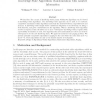Free Online Productivity Tools
i2Speak
i2Symbol
i2OCR
iTex2Img
iWeb2Print
iWeb2Shot
i2Type
iPdf2Split
iPdf2Merge
i2Bopomofo
i2Arabic
i2Style
i2Image
i2PDF
iLatex2Rtf
Sci2ools
127
click to vote
ALGORITHMICA
2011
2011
Knowledge State Algorithms
We introduce the concept of knowledge states; many well-known algorithms can be viewed as knowledge state algorithms. The knowledge state approach can be used to to construct competitive randomized online algorithms and study the tradeoff between competitiveness and memory. A knowledge state simply states conditional obligations of an adversary, by fixing a work function, and gives a distribution for the algorithm. When a knowledge state algorithm receives a request, it then calculates one or more “subsequent” knowledge states, together with a probability of transition to each. The algorithm then uses randomization to select one of those subsequents to be the new knowledge state. We apply the method to the paging problem. We present optimally competitive algorithm for paging for the cases where the cache sizes are k = 2 and k = 3. These algorithms use only a very limited number of bookmarks.
ALGORITHMICA 2011 | Algorithms | Artificial Intelligence | Knowledge State | Knowledge State Approach |
Related Content
| Added | 12 May 2011 |
| Updated | 12 May 2011 |
| Type | Journal |
| Year | 2011 |
| Where | ALGORITHMICA |
| Authors | Wolfgang W. Bein, Lawrence L. Larmore, John Noga, Rüdiger Reischuk |
Comments (0)

